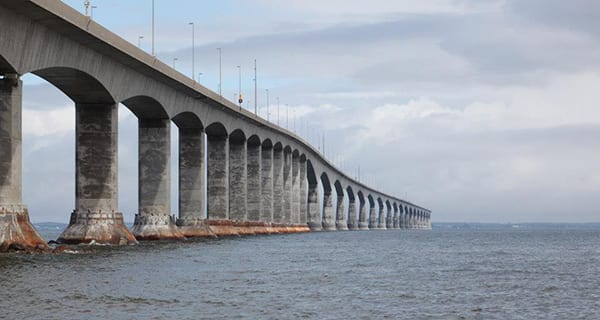 The recent campaign to remove tolls on the Confederation Bridge is a popular policy topic where rhetoric has become misguided.
The recent campaign to remove tolls on the Confederation Bridge is a popular policy topic where rhetoric has become misguided.
Prince Edward Island Sen. Percy Downe has pushed to remove the toll from the bridge, while P.E.I. Premier Dennis King has pledged to work on lowering the toll on the island’s primary connection to the mainland.
With discussions heating up, it’s time for a recounting of the facts about this expensive piece of infrastructure.
The toll arises from a deal between the federal government, Prince Edward Island and the private company paid to build and operate the bridge, Strait Crossing. The fee rises by a percentage of inflation yearly.
This toll was designed to cover both principal construction costs and ongoing maintenance expenses of the bridge.
The basic case for a toll on any major piece of infrastructure is simple. The bridge cost more than $1 billion when built in 1997 and costs millions of dollars to maintain and operate yearly.
How best can taxpayers and users of the bridge pay that bill?
Tolls ensure that people who actually use infrastructure are the ones who pay. The removal of a toll won’t mean the bridge doesn’t cost money to operate or didn’t cost money to build; it would simply shift the burden of paying from the people who use the bridge (and thus pay tolls), to the tax base in general.
This isn’t fair to those who don’t use the bridge and could create the illusion the bridge is free without a toll.
The absence of a toll creates a free-rider problem. Everybody pays but people who use the bridge – particularly those who use it a lot, like commercial trucking companies – would benefit unfairly from the artificially low cost to cross.
The burden of paying for the bridge is going to fall on some group of people, no matter what. This should primarily be the people who actually use the infrastructure. Asking all P.E.I. residents to pay through the provincial tax base or all Canadians through the national tax base wouldn’t be fair.
Another common argument is that drivers shouldn’t have to pay to leave their own province.
This is also bunk: you have to pay to get from Nova Scotia to Newfoundland and Labrador, or to travel within parts of many provinces due to road tolls. Indeed, there are many costs associated with travelling between provinces, including simply owning and maintaining a vehicle. Rightly, these costs are borne by users, not governments.
One option that has been discussed is to lower rather than remove the toll. While this isn’t as bad as removing it completely, any toll rate that’s artificially lowered by subsidy still falls into the free-rider problem. And all of this is to say nothing of the legal quagmire that could arise with bridge operator Strait Crossing if its revenues were to be cut by a reduced toll.
Strait Crossing has a contract to operate and maintain the bridge until 2032. Buying it out of that contract before it expires would be very costly for taxpayers. The appropriate time for a toll discussion is at the end of the contract, when more options are legally available.
But even then, there should be a toll set at a level that covers maintenance costs and supports the bridge financially.
We must also remember that the bridge as it’s constituted is a great deal for Islanders. Gone are the days of waiting for the ferry, frequent weather delays and so forth. With the bridge, you simply show up and cross, with almost perfect reliability and convenience.
The idea that the federal government should just pay the bill is also misguided. P.E.I. is already highly reliant on Ottawa to pay other bills and there’s no need to exacerbate this issue.
Those who point to the unfairness in the federal government’s support of removing tolls on Montreal’s Champlain Bridge are correct – but the answer is for both bridges to be tolled, not neither.
The bridge is a prime example of a private-public partnership gone right. At a time when it appears impossible for governments to move forward projects – pipelines come to mind – P.E.I.’s fixed link serves as an example of how things should work. We need to make more use of tolls to pay for infrastructure, not less.
Yes, it stings when you arrive to pay $47.50 to leave your own province. However, the fundamental truth remains: a toll is the fairest means of financing this costly piece of infrastructure. Removing the toll may be good politics but it’s neither fair nor wise.
Alex Whalen is an analysts at the Fraser Institute.
Alex is a Troy Media Thought Leader. Why aren’t you?
The views, opinions and positions expressed by columnists and contributors are the author’s alone. They do not inherently or expressly reflect the views, opinions and/or positions of our publication.



Your views are slanted and truly misguided. This unfair toll is detrimental to PEI. Everything and I mean every one of the goods Islanders rely on come across the toll bride. NOWHERE is there a toll on the Confederation highway.
This unfair tax on Islanders. It has to be removed!
Your views are slanted and truly misguided. This unfair toll is detrimental to PEI. Everything and I mean every one of the goods Islanders rely on come across the toll bride. NOWHERE is there a toll on the Confederation highway.
This unfair tax on Islanders. It has to be removed!